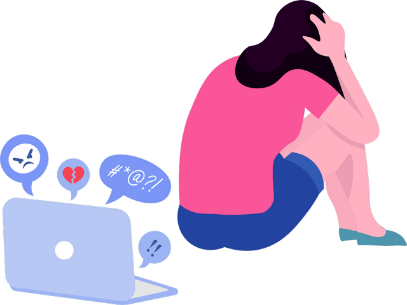Cyberbullying
“Be kind whenever possible. It is always possible.”
~The Dalai Lama
This quote still rings true to many but seems to have lost its impact ever since the internet came into existence. The anonymity of social media accounts seems to have given people the much detrimental power of bullying people online. With the increase of screen time during the pandemic, cases of such bullying are rising with each passing day. You have probably guessed by now that what lies ahead, is an article on cyberbullying.
Cyberbullying is when bullying takes place online, through text, email, gaming sites, or the place where it most commonly occurs- social media platforms, like Twitter, Facebook, Instagram, and other sites. Online bullying can leave one feeling humiliated, helpless, isolated, or even depressed and can lead to anxiety and low esteem.
Cyberbullying can include a variety of actions- posting personal information or pictures of someone who did not consent to such an action, writing mean, false, or offensive things about someone on the internet, messaging or threatening someone via text or email or other media, etc. – the list of actions that could fall under the umbrella of cyberbullying are endless. But the question is- how does one classify a certain post, message, or comment as cyberbullying? And when they do, how does one go about reporting or calling out cyberbullying, and how do we as a community of internet users ensure that our online experiences are safe and our comments on the internet are not harming anyone?
A post or message that makes one uncomfortable or is aimed at hurting a group or individual could easily be classified as cyberbullying. But oftentimes when people we know or are friends post or comment on something that may pass for a joke, it makes you uncomfortable, but you can’t quite point out if it’s considered bullying or not. This is when identifying cyberbullying can get tricky, but a simple rule of thumb is- if it makes you threatened or hurt, it most probably is a form of bullying and worth reporting. In such a case, you should always report it to an adult you trust- your parents, relatives, or teachers. If someone you know is bullying you online, confronting them about their behaviour is an option, as that sends out a clear message that you are not appreciative of their behaviour online and want them to stop. This could also boost your self-confidence. If you do not know the person bullying you online or are not willing to confront them, make sure to keep the evidence of any comments, posts, or messages that directly show that the person has bullied you. You could also report the same or find help on the online platform’s website.
When it comes to trying to have a pleasant online experience, do not tolerate any form of cyberbullying and don’t be one either. Be mindful of what you are putting on the internet and who is allowed to view what you are posting, commenting, or messaging. Just remember, when on the internet, one’s opinion is worth listening to only if it doesn’t hurt others. So don’t be the one tolerating or perpetrating cyberbullying. Every social media and online platform has the feature to report cyberbullying like Twitter, Facebook and Instagram or have terms that every user needs to agree to which prohibits various forms of cyberbullying like those on WhatsApp. Although all these features and terms do exist, these platforms can do better in preventing online bullying. Until then, we ought to educate ourselves about cyberbullying and be educated about this from a young age by teachers and parents. Google has even introduced a game called ‘Interland’ that preaches to ‘Be Internet Awesome’ and teaches them how to have a great online experience via 4 games.
I’ll end by reiterating what was said in the very beginning- “Be kind whenever possible. It is always possible”- whether it’s in real life or on the internet!
Urja is a fun-loving, energetic teen with a passion for writing and believes in having healthy discussions about various topics to gather perspectives. She wrote her very first poem in the fifth grade and has been writing poems and articles ever since. She also loves to read books and watch films and give her critical analysis on each scene, thanks to her English teachers. She landed the opportunity to write for UpTurn, which she thoroughly enjoys. She can’t wait to see what else comes her way in her literary journey.




